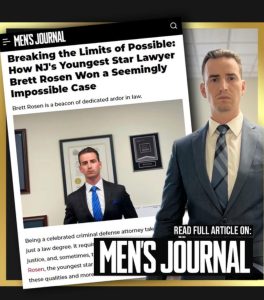Seeking a Second Chance? Understanding Pardons in New Jersey - A Comprehensive Guide by Brett M. Rosen, Esq.
What is a Pardon in New Jersey?

A criminal conviction can cast a long shadow over your life, affecting your employment prospects, housing opportunities, and even your personal relationships. In New Jersey, a pardon offers a chance for a fresh start, a way to move beyond the mistakes of the past and reclaim your future. This comprehensive guide by Brett M. Rosen, Esq., Certified by the Supreme Court of New Jersey as a Criminal Trial Attorney, explores the intricacies of pardons in New Jersey, providing valuable insights and guidance for those seeking to clear their record and restore their rights.
Pardon in New Jersey
A pardon is an act of executive clemency that forgives a crime and removes the legal consequences of a conviction. In New Jersey, the Governor has the sole authority to grant pardons for state-level offenses. A pardon does not erase the conviction from your record, but it signifies forgiveness and restores certain rights that may have been lost due to the conviction.
Types of Pardons in New Jersey
New Jersey offers two main types of pardons:
- Full Pardon: A full pardon completely forgives the offense and restores all civil rights, including the right to vote, the right to serve on a jury, and the right to hold public office. It also removes barriers to employment and licensing in many professions.
- Conditional Pardon: A conditional pardon forgives the offense but may impose certain conditions, such as restrictions on firearms possession or requirements for continued good behavior.
Eligibility for a Pardon
To be eligible for a pardon in New Jersey, you must generally meet the following criteria:
- Completion of Sentence: You must have completed your sentence, including any prison time, probation, parole, and fines.
- Waiting Period: There is a waiting period of five years for most offenses before you can apply for a pardon. The waiting period may be longer for certain serious crimes.
- Good Conduct: You must have demonstrated good conduct and rehabilitation since the completion of your sentence.
- No Pending Charges: You cannot have any pending criminal charges or be under investigation for any crimes.
- Nature of the Offense: The nature and severity of the offense will be considered. Pardons are less likely to be granted for violent crimes or offenses involving public safety.
The Pardon Process in New Jersey
The process for obtaining a pardon in New Jersey involves several steps:
- Application: You must submit a detailed application to the New Jersey State Parole Board, which includes information about your conviction, your rehabilitation efforts, and your reasons for seeking a pardon.
- Investigation: The Parole Board will conduct an investigation into your background, including your criminal history, employment history, and community involvement.
- Hearing: You may be required to attend a hearing before the Parole Board, where you can present your case and answer questions.
- Recommendation: The Parole Board will make a recommendation to the Governor on whether to grant or deny your pardon application.
- Governor’s Decision: The Governor has the final authority to grant or deny a pardon.
Benefits of a Pardon
A pardon can provide numerous benefits, including:
- Restoration of Rights: It can restore your civil rights, such as the right to vote, serve on a jury, and hold public office.
- Improved Employment Opportunities: It can remove barriers to employment and professional licensing.
- Enhanced Housing Options: It can make it easier to obtain housing, as landlords often conduct background checks.
- Personal Satisfaction: It can provide a sense of closure and allow you to move forward with your life.
- Immigration Relief: In some cases, a pardon can help to prevent deportation or other immigration consequences.
- Professional Licensing: It can remove obstacles to obtaining professional licenses in certain fields.
Defenses in Criminal Cases
While a pardon can provide relief after a conviction, it’s always best to avoid a conviction in the first place. Brett M. Rosen, Esq. is a skilled criminal defense attorney who will explore all possible defenses to protect your rights and fight for the best possible outcome in your case. Some common defenses include:
- Lack of Evidence: Challenging the sufficiency of the evidence against you.
- Constitutional Violations: Arguing that your constitutional rights were violated during the investigation or arrest.
- Affirmative Defenses: Raising defenses such as self-defense, duress, entrapment, or lack of intent.
- Challenging Witness Credibility: Attacking the credibility of witnesses who testify against you.
- Presenting an Alibi: Providing evidence that you were somewhere else at the time of the alleged crime.
FAQs about Pardons in New Jersey
- How long does it take to get a pardon in New Jersey?
- The pardon process can take several months or even years, depending on the complexity of the case and the backlog of applications.
- Does a pardon expunge my criminal record?
- No, a pardon does not erase the conviction from your record. However, it signifies forgiveness and restores certain rights.
- Can I apply for a pardon if I was convicted in another state?
- No, the Governor of New Jersey can only grant pardons for state-level offenses committed in New Jersey.
- What if my pardon application is denied?
- You may be able to reapply after a certain waiting period, typically one year.
- How much does it cost to apply for a pardon?
- There is no fee to apply for a pardon in New Jersey.
FAQs Continued
What is the difference between a pardon and expungement?
- A pardon forgives the offense but does not erase the conviction from your record. An expungement seals your record, making it inaccessible to the public.
Can I apply for a pardon if I have multiple convictions?
- Yes, but it is generally more difficult to obtain a pardon with multiple convictions.
Does a pardon guarantee that I will get a job or housing?
- While a pardon can remove legal barriers, it does not guarantee employment or housing. Employers and landlords can still consider your criminal history, but a pardon can show that you have been forgiven and are taking steps to rehabilitate yourself.
What if my pardon application is denied?
- You may be able to reapply after a certain waiting period, typically two years.
Why Choose Brett M. Rosen, Esq. for Your Criminal Defense?

Brett M. Rosen, Esq. is a Certified Criminal Trial Attorney with extensive experience in representing clients seeking pardons in New Jersey. He understands the complexities of the pardon process and will guide you through every step, from preparing your application to advocating for your case before the Parole Board. He will also explore all possible defenses to protect your rights and achieve the best possible outcome in your criminal case.
If you are seeking a pardon in New Jersey or are facing criminal charges, contact Brett M. Rosen, Esq. today for a free consultation. He is available 24/7 to discuss your case and provide expert legal guidance.
908-312-0368 & brett@nynjcriminalcivilesq.com
Disclaimer: This information is for informational purposes only and should not be considered legal advice. It is essential to consult with an attorney to discuss your specific legal situation.
